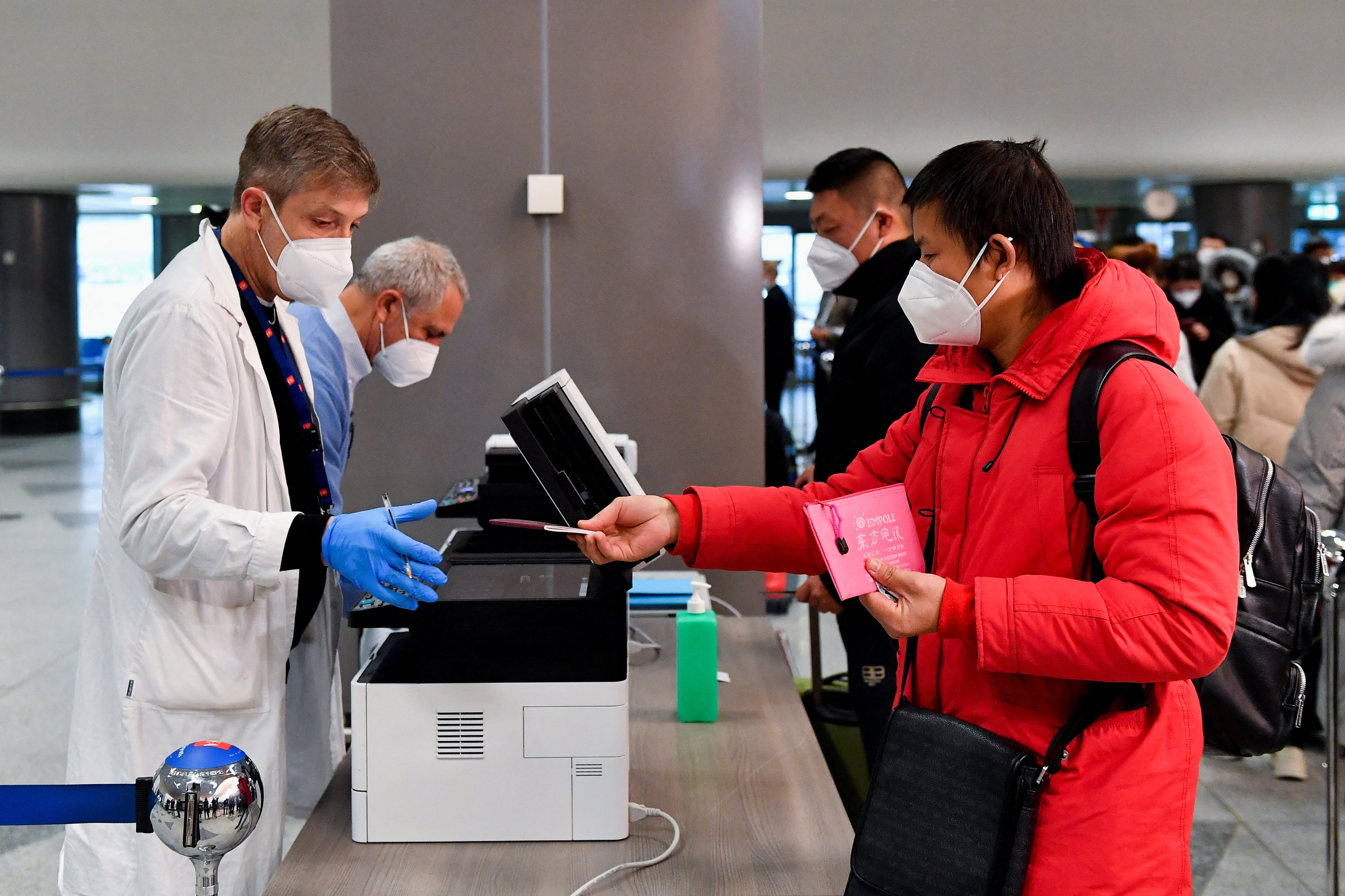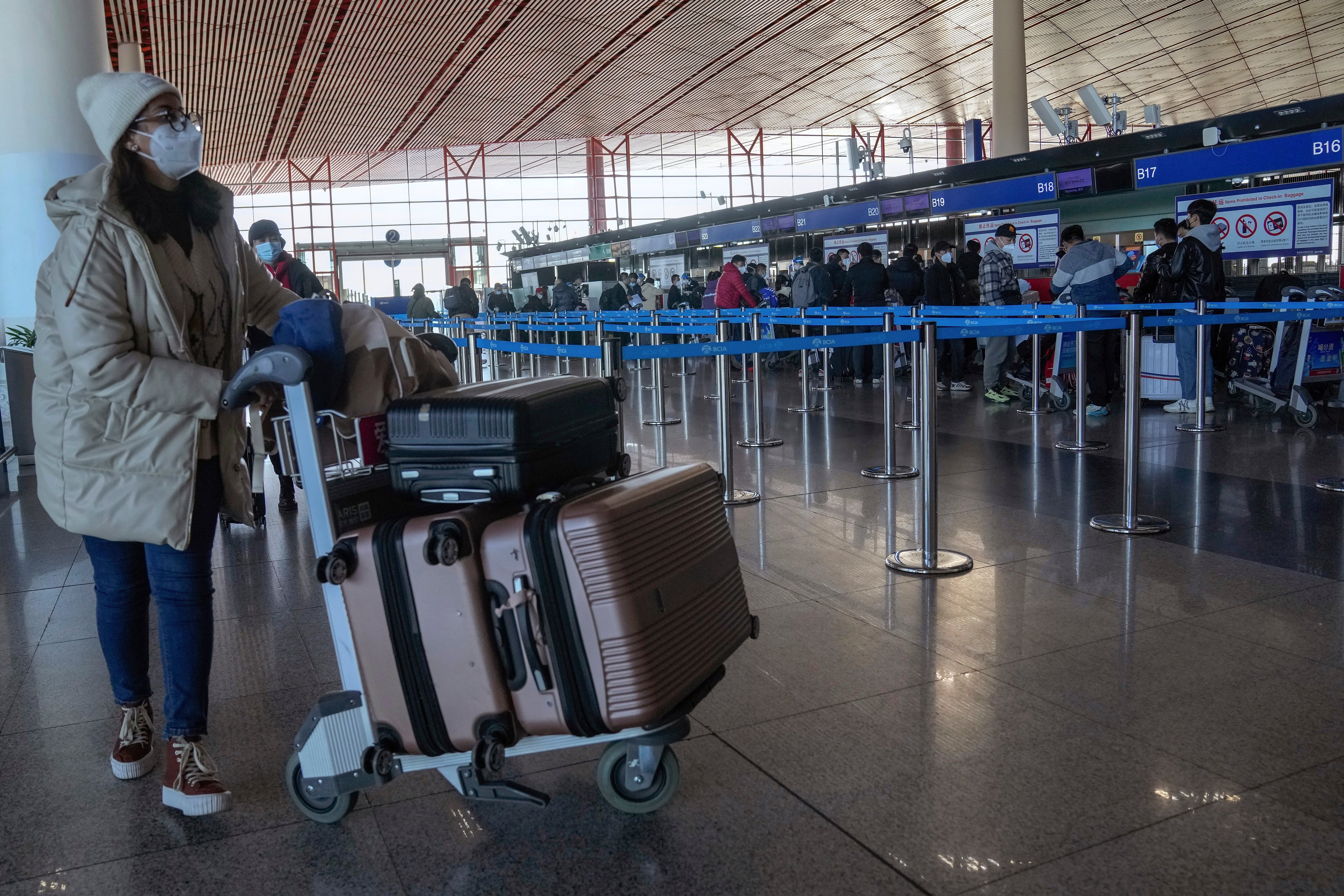Covid: Travellers from China to need negative test to enter UK in government U-turn
France and Spain also imposes restrictions as cases soar in Beijing
Your support helps us to tell the story
From reproductive rights to climate change to Big Tech, The Independent is on the ground when the story is developing. Whether it's investigating the financials of Elon Musk's pro-Trump PAC or producing our latest documentary, 'The A Word', which shines a light on the American women fighting for reproductive rights, we know how important it is to parse out the facts from the messaging.
At such a critical moment in US history, we need reporters on the ground. Your donation allows us to keep sending journalists to speak to both sides of the story.
The Independent is trusted by Americans across the entire political spectrum. And unlike many other quality news outlets, we choose not to lock Americans out of our reporting and analysis with paywalls. We believe quality journalism should be available to everyone, paid for by those who can afford it.
Your support makes all the difference.Travellers from China will need a negative Covid test to enter the UK in a major government U-turn.
The move comes after criticism from Tory MPs who have called for a more robust response from the government after the lifting of restrictions in China prompted a wave of new infections.
UK ministers said on Thursday that they were reviewing whether to require travellers from China to take Covid tests – 24 hours after saying they had no plans to introduce mandatory checks.
The rule change, confirmed by the Department of Health and Social Care (DHSC) on Friday, will see anyone travelling from China on direct flights to England from 5 January to show proof of a negative test before flying.
The UK Health Security Agency (UKHSA) will also start testing a sample of passengers arriving from China from 8 January.
Health secretary Steve Barclay said the government was taking a “balanced and precautionary approach”, saying the measures as “temporary” while officials assess the latest Covid data.
“This allows our world leading scientists at the UKHSA to gain rapid insight into potential new variants circulating in China,” he said.
The move follows similar action by several countries, including the US, India, Italy, South Korea and Taiwan, who require visitors from China to be tested for the virus.
On Friday, Spain and France also announced requirements for negative tests prior to departure for passengers travelling from China.
The measures are the first testing requirements to be reintroduced since the government removed all countries considered high risk from its red list in October 2021.
Prime minister Rishi Sunak is reported to have stepped in himself to increase restrictions on travellers from China, according to The Times and The Daily Telegraph.
It comes after Tobias Ellwood, chair of the Commons defence select committee, told LBC that the government should already have convened a Cobra emergency meeting to look at the issue.

He said: “We should be taking our own precautionary measures … we do not know what variants of Covid have developed in China in the three years of their lockdown.
“Any dithering leaves us as a hostage to fortune … The later you leave any action, the less impact it will have. Let’s get testing in place for passengers regardless of nationality of all incoming flights from China.”
Tory MP David Davis suggested that mandatory testing for those coming from China was a “pretty sensible requirement”.
“If somebody turns up with the next virulent variant from China, we want to have processes in place - I think the government should certainly consider it and I would ideally implement it,” the former cabinet minister told LBC.
It is understood the government has brought in the screening to align with the US, in part due to concerns about the lack of reliable Covid data from China.

The move is expected to be precautionary and temporary, with the hope that China will improve its Covid surveillance.
Tedros Adhanom Ghebreyesus, the director-general of the World Health Organisation (WHO), said on Thursday that it was “understandable” that countries were acting to protect their populations “in the absence of comprehensive information from China” on case numbers.
“We remain concerned about the evolving situation and we continue encouraging China to track the Covid-19 virus and vaccinate the highest risk people. We continue to offer our support for clinical care and protecting its health system,” he said.
But Professor Sir Andrew Pollard, chairman of the Joint Committee on Vaccination and Immunisation (JCVI), warned on Friday that the imposition of travel restrictions was unlikely to stop new variants reaching the UK.
He told the BBC Radio 4 Today programme: “Trying to ban a virus by adjusting what we do with travel has already been shown not to work very well. We have seen that with the bans on travel from various countries during the pandemic.”
“The important thing is that we have surveillance that when a virus is spreading within our population here in the UK or Europe we are able to pick that up and predict what might happen with the health systems and particularly the more vulnerable in the population.”




Join our commenting forum
Join thought-provoking conversations, follow other Independent readers and see their replies
Comments